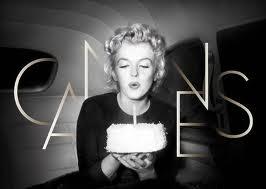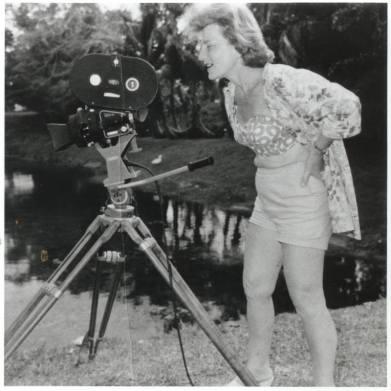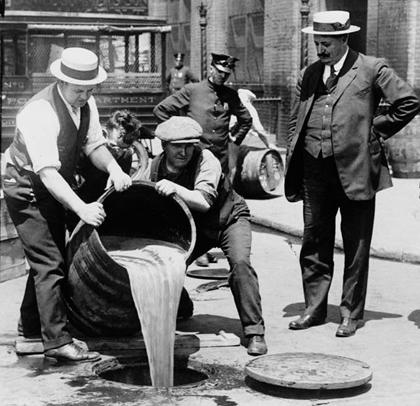
I drove past the A7 today, L’Autoroute du Soleil (the Sun Highway) which links Lyon to Marseille, and at 9:30 am, it was already backed up to Valence. As it’s a work holiday for the Ascencion, and the start of a four day weekend, inevitably many were on their way down south to search for sea, sex, and sun. And stars.
The Cannes Film Festival begins today and this year marks a big milestone for the world reknowned festival as it will blow out 65 candles on it’s birthday cake. But amidst the celebration, it’s impossible not to acknowledge the elephant in the room- the fact that out of 22 films nominated for the Palme D’Or, none are them are directed by a woman.
Unsurprisingly, there’s been much criticism about the lack of women filmmakers, and even a bit of defense of the panel’s decision, in the media. I’ll admit it’s hard to imagine that in 2012, there aren’t any female directors’ films that warrant nomination at Cannes. But it’s possible for the sheer reason that women account for only 5% of film directors in the world.

While I don’t think that there should be affirmative action for film festivals, the repeated diminutive representation of women brings back a flood of memories from my years as an undergrad. I received my bachelor’s degree in filmmaking and except for the first year general media studies classes, I was consistently one of 2-3 girls in my classes, even screen-writing classes. I was a dedicated student throughout most of my film schooling, logging at least 25 hours a week outside of class on projects, waking up at 3 am to get to the editing rooms before anyone else, and of course, becoming allies with the 7-11 attendant across the street, a fellow film student, who always hooked me up with free coffee. It was rigorous, tiring, and expensive to follow this kind of schedule while students in the other departments seemed to do nothing but party on the weekends while we were working and arguing like a big dysfunctional family in the studios. These guys were like a family to me and by the time I graduated, I was sad to leave this group of scraggly, creative boys who had over the past fours years become like my brothers – supportive, protective, and kind of stinky.
When I read the articles about sexism at Cannes, I’m reminded of my old classmates who mostly seemed to be true-to-heart feminists. Film school, however, is not a microcosm for the cut-throat film world, and I’m certainly not as naïve as to defend all male filmmakers. It would be a lie to say the industry is feminist and fair- it is much more difficult for women to receiving financial backing than men, and there’s a fair share of veritable, power-hungry mysoginists out there. But it might be rash to blame Cannes’ organizers of unequivocal sexism when there is a deeper issue involved that traces back to the fact that 95 % of filmmakers are men.

I’m guilty of lowering the male/female ratio of the cinema world early on, but not because I felt like I didn’t belong as a woman. While I loved my filmmaking classes in school, I knew that my passion lied somewhere else, and instead of following my classmates and moving to LA after graduation, I moved to France. Which in turn, led me in a roundabout way to where my fascination lies: wine, another male-dominated industry.
Garçon-manqué, which translates to ‘missed boy’, is the French expression for tomboy. I’ve always had a prominent tomboy side to me- I learned to olly on my skateboard at 13 when other girls were learning to apply mascara. I am one who speaks my mind directly and freely, traditionally a masculine attribute; and even physically, I have as what is described as a ‘boyish’ frame. So I guess it’s not surprising that I would immerse myself in a field where my gender is grossly outnumbered. While I am entranced by wine, terroir, and the history that comes along with it, working in this domain is not always easy. I’ve experienced numerous undeserved condescending attitudes because I’m a woman, equally in France and the U.S. Instead of fighting the machoism head-on, like I’m inclined to do, I now try to keep my ‘Anything you can do, I can do better’ reaction to myself, and tackle this problem just as fiercely, just using more subtlety in my strategy.

I’ve learned that to overcome the gender differences in the wine world, and the obstacles that come with it, I must master a delicate balance of patience, humility, and self-confidence. This trifecta applies to my personality, strengths and weaknesses, and is not necessarily useful for other women, although it could help some. Humility doesn’t mean being demure and succumbing to others’ pressures, it just means being modest enough to really listen to other’s experiences and insight. I’ve let my proclivity towards pride get in the way before, and often, to my detriment. So striving for an equilibrium of self-confidence/patience/humility has proven to be my greatest weapon when dealing with patronizing, smarty-pants types, men or women. Although it’s changing and wine is becoming more accessible and less elitist, it still seems to attract know-it-alls, who are just dying to tell you what they know, what they have drunk, and what countries they have visited. And statistically based on the numbers of men in the wine industry, these know-it alls tend to include more men than women.

Nevertheless, I wouldn’t qualify the male dominance in the wine industry as pure, institutionalized sexism anymore; it’s more nebulous and goes deeper than that. In both film and wine, there is a long history of men in power, and it’s going to take some time to break that pattern. People inherently don’t think something is made for boys or girls, it’s learned in childhood. I believe it ultimately starts with the family, and luckily, I’ve always been encouraged by my family to follow my interests, whether it’s cooking, skateboarding, or writing. And if there are not enough women who actually show interest in men-run fields, as I witnessed in my film classes and throughout my whole wine career, it’s a symptom of a greater epidemic in our society’s perception of gender roles.
Nothing changes overnight, but I think there will be a day when there will be an equal balance of men and women in wine and film, along with all areas of the workforce. What are you waiting for? 5, 4, 3, 2, 1, Action!
